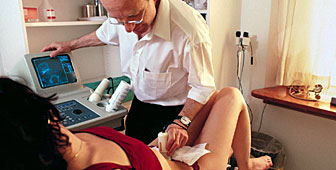Voters to pass judgement on abortion

The Swiss have begun casting their votes on whether abortions should be brought in line with reality. Although banned, thousands of terminations are carried out each year.
Polls show a clear majority in favour of legalising abortion within the first 12 weeks of pregnancy. But voters will also be asked whether the 1942 law, which prohibits abortion unless a woman’s health is in danger, should be tightened.
At present, between 12,000 and 13,000 terminations are performed every year – that is about one in eight pregnancies – because the interpretation of the law is left to the regional health authorities.
Most of the country’s 26 cantons, particularly in urban regions, have introduced more liberal policies in the past few years, effectively offering abortion on demand. Only three small cantons in predominantly Catholic rural areas maintain an outright ban.
Backing abortion
The proposal to legalise abortion within the first 12 weeks of a pregnancy has the backing of government, parliament, and two of the four main political parties, as well as the Protestant Church and the country’s main women’s organisation, Alliance F.
Those opposed to legalisation include the Christian Democratic Party, which has its stronghold in mainly Catholic regions, and the right-wing Swiss People’s Party. Religious and fundamentalist groups as well as the Catholic Church are also against.
Barbara Haering, a member of parliament, has been instrumental in efforts to bring the issue to a nationwide vote. She launched the latest debate in parliament nearly 10 years ago, and believes the decision to have an abortion should be exclusively up to the woman concerned.
“You can not delegate [such decisions]. Neither the church, nor the state nor physicians can take them for the woman, ” Haering told swissinfo. “It’s a decision of conscience and I do believe that we live in a time where you have to take decisions of conscience on your own.”
Tightening the law
A second proposal on Sunday’s ballot sheet calls for an outright ban on abortions, even in cases of rape. The proposal, condemned as draconian by critics, would only allow abortion if a woman’s life were in danger.
The country’s main pro-life group, Swiss Aid for Mother and Child, collected enough signatures to force a nationwide vote. But the group has the open backing of only one fundamentalist religious party.
The main women’s organisation and the Protestant Church have both come out against the initiative, while the Catholic Church recommends that voters reject both proposals.
Monika Dättwyler of Swiss Aid for Mother and Child says protecting the life of the unborn child takes precedence over everything else.
State should “protect unborn child”
“For us the human life is precious and the state should protect the unborn child and lay down guidelines for the necessary assistance for mothers in need.”
She vehemently rejects any policy that encourages a liberal solution: “It is absolutely not right that a mother in a situation of distress has to go to abort a child.”
Dättwyler is convinced that a lot can be achieved by counselling and improving day care facilities, as well as by offering psychological or financial assistance for pregnant women so they are encouraged to keep their child.
Supporters of legalisation agree with Dättwyler on the importance of better assistance for women in a difficult situations, but they doubt whether a tightening of the law would reduce the number of abortions, says Barbara Haering.
Previous votes failed
Sunday’s ballot is the fourth vote on abortion in Switzerland since 1977. But all previous attempts to either tighten or ease regulations on a nationwide level have failed to win a majority.
The latest opinion polls, commissioned by national television, show that about 63 per cent of voters support legalisation, with 31 per cent in favour of a strict ban on abortion.
Anne-Marie Rey who was involved in all previous votes and who supports a more liberal policy says the past few decades have seen considerable social and political changes in Switzerland.
Thirty years ago only the feminist movement and some women’s organisations fought for a liberalisation, says Rey.
“Nowadays a very large coalition supports an easing of abortion laws – political parties, professional organisations, doctors’ organisations and women’s groups; and not only from the left .”
This change, Rey adds, is in line with a generally more liberal attitude towards sexuality and the different perception of the role of women in society.
However, the issue of abortion remains as emotional as ever. Critics say pro-life groups are still peddling the same rhetoric, and accuse them of clouding the issue with an emotive campaign featuring, for example, posters of children asking their parents to let them live.
Low abortion rate
Switzerland’s abortion rate is among the lowest of any developed country. Nearly half the patients are women over the age of 30, while teenager pregnancies account for about ten per cent of terminations.
Official figures show that foreign women tend to resort to abortion more readily than their Swiss counterparts.
Rey says this is because many non-Swiss abortion patients come from countries in Eastern Europe, South America and Africa, where contraception is frowned upon. Abortion [in these countries] is a way of birth control.”
Compared with other European countries Switzerland has – in theory – some of the most restrictive abortion laws alongside the Irish Republic, Poland and Portugal.
In practice, however, the Swiss treat abortion in the same way as most of their European neighbours.
France and Italy introduced liberal abortion laws in the 1970, while counselling is mandatory in Germany and Austria before a woman can have a termination.
by Urs Geiser

In compliance with the JTI standards
More: SWI swissinfo.ch certified by the Journalism Trust Initiative

You can find an overview of ongoing debates with our journalists here. Please join us!
If you want to start a conversation about a topic raised in this article or want to report factual errors, email us at english@swissinfo.ch.